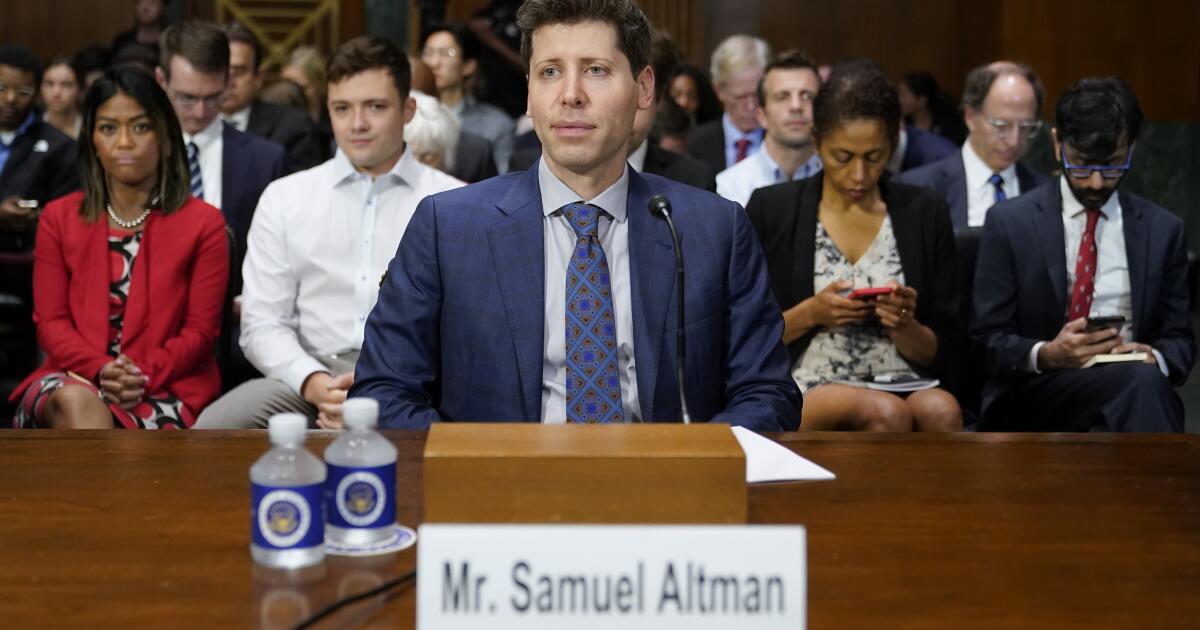She helped OpenAI win over world leaders. Can she keep the peace?
Anna Makanju orchestrated Sam Altman’s political debut like a diplomatic mission. But Congress’s AI push could test the company’s friendly reputation.
A photo of the meeting had all the hallmarks of a state visit: Altman and the prime minister smiled at each other, perched in matching upholstered chairs.
Outside the photo’s frame was the shrewd but self-effacing executive who orchestrated the summit: Anna Makanju, OpenAI’s vice president of global affairs.
Makanju has engineered Altman’s transformation from a start-up darling into the AI industry’s ambassador — designing his outreach like a diplomatic mission, towing the CEO across 25 cities and six continents on a four-week tour marking his debut on the global stage. Drawing on experience in national security during the Obama administration, she has been by Altman’s side as he huddled with Spanish Prime Minister Pedro Sánchez, Israeli President Isaac Herzog and Senate Majority Leader Charles E. Schumer.
When global leaders were rattled during Altman’s dramatic five-day ouster in November, it was Makanju fielding their messages, reassuring them that the company would continue to exist.
“She’s de facto the foreign minister of one of the most important companies in the world,” said Michael McFaul, who served as the United States ambassador to Russia during the Obama administration and is the director of Stanford University’s Freeman Spogli Institute for International Studies, where Makanju sits on the advisory council.
Tech companies traditionally shun Washington until trouble emerges, asking for forgiveness rather than permission. Mark Zuckerberg first testified in front of Congress after the Cambridge Analytica scandal, when the political consulting firm gained unauthorized access to the platform to harvest user data. The testimony was more than 14 years after he founded Facebook, now Meta.
**But Makanju, a veteran of SpaceX’s Starlink and Facebook, has turned the Silicon Valley lobbying blueprint on its head. Rather than waiting for scandal like Zuckerberg or exhibiting bravado like SpaceX founder Elon Musk, she has spent years courting policymakers with a more solicitous message: Regulate us.
Thanks to her strategy, Altman has emerged as a rare tech executive lawmakers from both parties appear to trust.
As Senate Majority Leader Charles E. Schumer moves closer to AI regulation — unveiling a bipartisan framework in the “near future,” Schumer spokeswoman Allison Biasotti said — he has consulted Altman and other OpenAI executives. Rep. Jay Obernolte (R-Calif.) said in a December Post Live interview that he likes Altman and that the company is “going to continue to be an influential player in AI” following his return to the helm.
Makanju positions the company’s activities as education, rather than lobbying — an AI school for curious politicians.
“Because we’re not pursing a specific legislative and regulatory outcome, it’s not really traditional lobbying,” she said in late summer over breakfast at Cheryl’s Global Soul, a restaurant near her Brooklyn home. “We really want to be a technical partner to regulators.”
But OpenAI, which has taken billions of dollars in investment from Microsoft, is not a neutral tutor. Its intimate seat with policymakers has bestowed Altman a rare form influence. And the company’s critics are wary that a campaign playing out in closed door meetings sets the stage for regulatory capture.
**“They’ve been very effective,” said Merve Hickok, president and research director of the Center for AI and Digital Policy, which filed a complaint against the company with the Federal Trade Commission . “Whether that is good or bad for public safety, public interest, is another question.”
A multilingual third-culture kid raised across four continents, Makanju’s childhood was a training in cultural diplomacy.
Her Nigerian father received a scholarship to study medicine in the U.S.S.R., through what Makanju calls effectively a Soviet “soft power” program. “They would be trained in the Soviet Union and then they could bring communism back to their home countries,” she said. He met her mother in a bar popular with Soviet students trying to practice English.
Makanju spent much of her early childhood with her grandparents in St. Petersburg, then called Leningrad, where she said few residents had seen other Black people. She bounced around Lagos, Nigeria, Germany, Arizona and Kuwait before she attended high school in Texas, moving with her mother, an engineer struggling to find work amid the Cold War.
When she first came to the United States at 10, she had never seen an ad or tried breakfast cereal. She became obsessed with a spot for Cheerios that showed milk, strawberries and a “magical substance” flowing out of a box. She and her younger sister saved up their $0.25 allowance for weeks so they could buy the biggest box to open like in the commercial.
“Some weird dry things came out,” Makanju said. “It was truly at the time one of the most incredibly disappointing experiences.”
Makanju was schooled in the art of statecraft during nearly a decade in the Obama administration, where she worked in a number of national security roles. She was a special adviser to Biden on Europe and served as the director for Russia on the White House National Security Council in 2014, as the Obama administration grappled with Russia’s annexation of Crimea.
McFaul said he was “blown away” by Makanju’s deep knowledge about Russian affairs and fluency in the language when they met during Obama’s presidency.
“She’s a very sophisticated citizen of the world, and she’s dealt with the bad guys,” McFaul said.
Concerns about the Russian interference are what drew her to a job at Facebook. Government officials spent years working on social media election interference, Makanju said. But she spent “almost no time” talking to people within Silicon Valley companies about the problem.
“One of the things that I most regret about working in government is not spending more time with industry,” she said.
Makanju initially worked on the company’s election safeguards and later shifted to a role determining Meta’s policies for political advertising around the world, at times fielding questions from policymakers increasingly interested in regulating online spots.
In 2021, as OpenAI was beginning to think about how to deploy its AI models, its executives realized they needed to win over the public and policymakers, said Mira Murati, OpenAI’s chief technology officer. After working on global policy for Starlink and having navigated years of scandals at Facebook, Makanju was the perfect person for the job.
At OpenAI, Makanju saw chance to change convention by anticipating crisis with a strategy. OpenAI was virtually unknown, and its AI tools were not generally available to the public. The blank slate, she felt, offered a chance to build trust preemptively.
“We could start doing this much earlier in the process, start shaping their thinking, helping people understand the technology,” Makanju said.
Makanju spent her first day using GPT-3, amazed by the technology’s capabilities. She was struck by how the tool could’ve sped up her work in government, using it to quickly evaluate, for example, how Russia had discussed the expansion of NATO over time. But she also saw its potential downfalls. She was concerned it could be abused by authoritarian regimes to engage in mass surveillance of citizens; she imagined governments using the technology to transcribe conversations or scan phone calls.
Makanju initially had no direct reports, and focused on building personal relationships with policymakers already working on the technology, including the AI caucus in the U.S. Congress and Brussels, where work was already underway on the E.U. AI Act. The company was relatively unknown in Washington, where AI hearings were sparsely attended and issues like antitrust and social media policy dominated discussions about tech regulation.
That all changed about a year later, when the company unveiled ChatGPT.
“Her challenge back then was to get anyone to talk to us,” Murti said. “Now everybody wants to talk to us.”
The chatbot’s release sparked an international panic in policy circles. Lawmakers in the European Union rushed to update the legislation years-in-the making to account for generative AI. Policymakers in the United States began a bipartisan effort to get up to speed, hosting forums and hearings on the technology. In congressional testimony Altman laid out a plan to form a new government agency charged with licensing AI models and to require independent audits of technology.
Makanju prepped Altman for the grilling, coaching the green CEO on the structure of congressional hearings and the cadence of the conversation before his first Capitol Hill appearance.
“Some people were surprised that we were bringing him to the Hill at that stage,” she said. “This is the time to be speaking with lawmakers and working with them as proactively as possible, verses waiting until there’s a crisis.”
It worked. Altman received an unusually warm reception from lawmakers, as Sen. Richard Blumenthal (D-Conn.) called his willingness to commit to action “night and day” compared to other tech executives.
That image of Altman faces challenges, amid reports OpenAI sought to water down the E.U. AI Act and others detailing efforts to fundraise in the Middle East.
Relations could further strain as legislation begins to solidify in the United States.
“If they don’t like the regulation that comes in or they say that’s not what we meant, then people start to get upset,” said Katie Harbath, a former Facebook policy director who hired Makanju.
Promoting Altman as a statesman for AI could also backfire.
Zuckerberg — who has since become a punching bag for global leaders — provides a cautionary tale. In 2015, the Facebook CEO posted pictures of himself jogging around the India Gate in Dehli and admiring the Taj Majal — a signal of the company’s growing interest in reaching people in India who were coming online. Instead, Zuckerberg was criticized for targeting India’s poor with a subpar version of the web. India now has the most Facebook users in the world, but the company has been accused of bowing to government censorship and fomenting hate.
Makanju finds the comparisons between Zuckerberg and Altman amusing. Unlike Facebook, OpenAI does not have a massive public policy apparatus orchestrating Altman’s moves, she argues. The entire trip was planned by her and another colleague. And because OpenAI has a distinct corporate structure and has been thinking about risks since its inception, it won’t make the same mistakes.
“We genuinely believe that our mission, our fiduciary duty, is to humanity,” she said. “And we’re not going to do things with our business that we think are contrary to the mission.”
Patricia Gruver-Barr, co-founder of the Tech Diplomacy Network, warned that OpenAI’s diplomatic mission could give the company outsize influence on the world stage, fomenting regulations that favor OpenAI over smaller companies and upstarts.
“We’ve seen this power asymmetry emerge between the nation state and these big tech companies — a handful of companies in Silicon Valley in particular — that have more geopolitical power than any company or industry has had in the past,” said Gruver-Barr, a former science attaché for the British and Québec governments.
Amid the growing clamor in Congress to regulate AI, the company is bringing in reinforcements. After years of outreach to lawmakers, OpenAI in fall 2023 disclosed its first in-house lobbyist, and reported that it is working with global law firm DLA Piper, according to federal disclosures. OpenAI to date has not advocated for or against any specific bill, Makanju says, but she anticipates that will change in 2024, especially with the Schumer effort that is underway. Makanju’s team is also growing around the world, with more than 20 people in the United Kingdom, Germany, Japan and Brazil.
Makanju says it’s in the public interest for politicians to gather a host of perspectives about AI, including from industry.
“The companies that are building these tools know the most about them,” she said.
And that’s why they should keep talking to her.
Nitasha Tiku contributed to this report.









